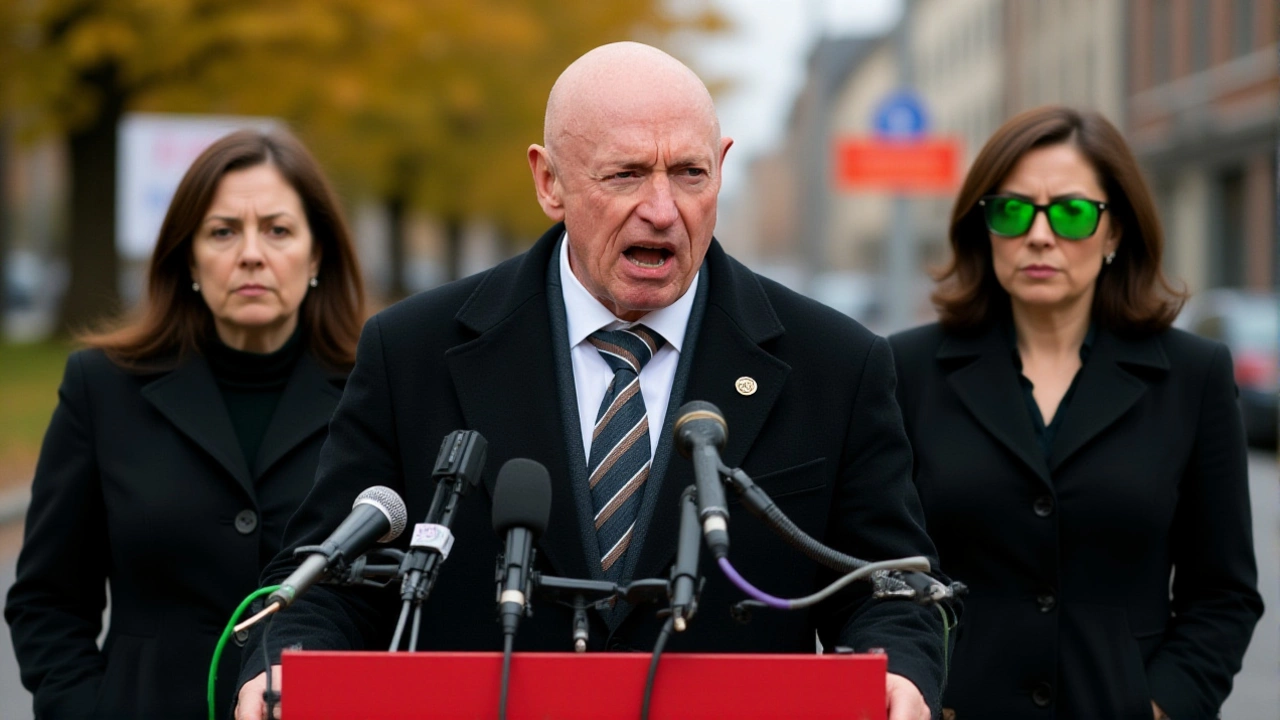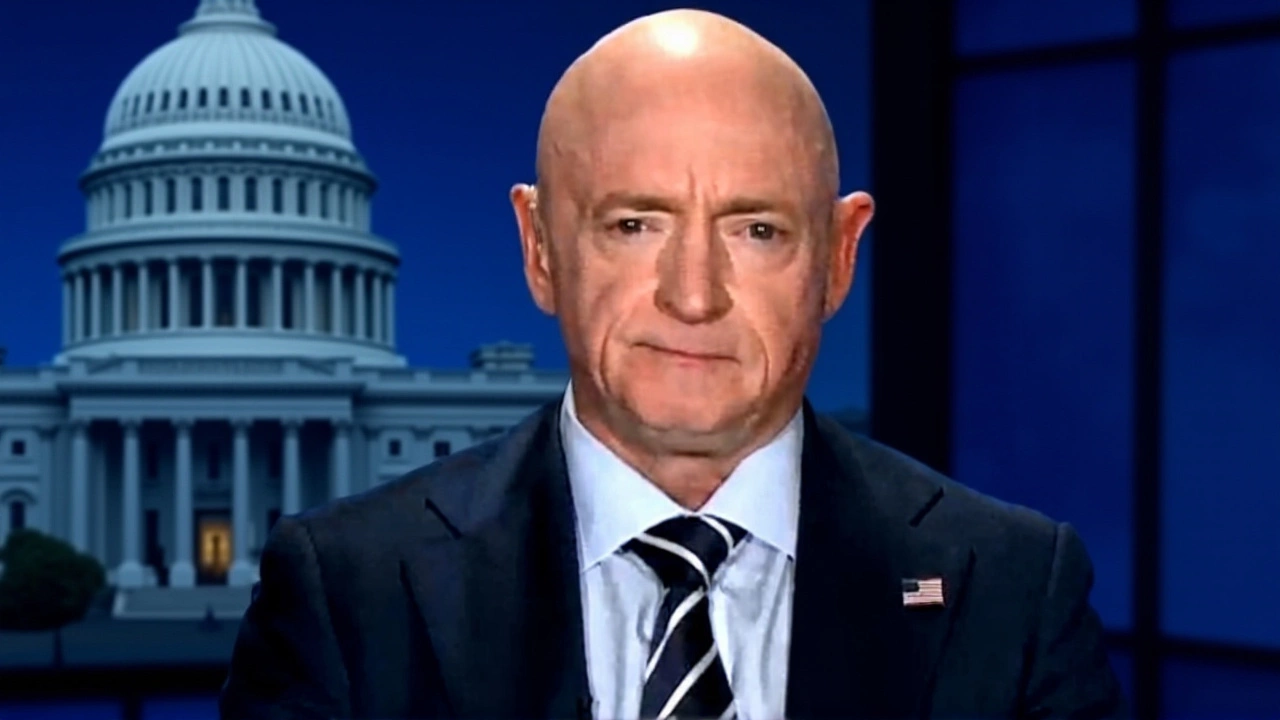The Mark Kelly, a retired U.S. Navy captain and sitting U.S. Senator from Arizona, is facing an unprecedented military investigation after a video he helped produce urged active-duty troops to refuse unlawful orders. The Pentagon announced on November 24, 2025, that it is examining whether Kelly violated 10 U.S.C. § 973—a law prohibiting retired service members from actions that undermine military discipline. The probe could lead to his recall to active duty and court-martial for sedition, a charge that carries a potential death penalty under the Uniform Code of Military Justice. This isn’t just about one senator. It’s about whether the military, long held as a nonpartisan institution, is now being weaponized against political opponents.
What Triggered the Investigation?
The controversy began on November 18, 2025, when Senator Kelly, alongside five other Democratic lawmakers, appeared in a video produced by a progressive military advocacy group. In the clip, Kelly, speaking plainly and without script, told service members: "You have the right—and the duty—to refuse illegal orders." The other lawmakers, including former military officers like Jason Crow and Mikie Sherrill, echoed the message, urging troops to "stand up for the Constitution."
The video came amid growing unease among military personnel over the Trump administration’s recent airstrikes on vessels off the coasts of Central and South America. The Pentagon claims these targets are drug traffickers designated as terrorists under Executive Order 13224, but critics—including some within the military—argue the strikes violate international law and lack congressional authorization.
Kelly, who flew combat missions in the Gulf War and commanded two Space Shuttle missions, said he spoke out because he’d seen too many young sailors pressured into morally ambiguous missions. "I had a missile explode near my jet," he later told reporters. "I watched bombs fall on targets I wasn’t sure were legitimate. I helped recover the bodies of my crewmates from Columbia. I’ve served this country when it was right—and when it was wrong. I’m not afraid to say what I believe."
The Pentagon’s Unprecedented Move
What followed was startling. On November 23, Defense Secretary Pete Hegseth posted on social media labeling Kelly and the five others the "Seditious Six," calling their video "despicable, reckless, and false." Two days later, President Donald Trump doubled down, writing: "One of the traitors our Country be ARRESTED AND PUT ON TRIAL. Punishable by DEATH!"
By November 24, the Pentagon issued a formal statement: "A thorough review... may include recall to active duty for court-martial proceedings." For the first time in modern U.S. history, a sitting senator—especially one with Kelly’s record—is being threatened with military prosecution for political speech.
Legal experts are stunned. "This is not how this works," said Professor Rachel VanLandingham, a former Air Force judge advocate. "Hegseth’s public comments alone could taint any trial. If you’re going to charge him with sedition, you can’t go on TV and call him a traitor. That’s undue command influence—and it’s grounds for dismissal."

Why Kelly—and Not the Others?
Here’s the twist: Kelly is the only one of the six who formally retired from the military. The other five—Crow, Sherrill, Houlahan, Slotkin, and Bergman—are all retired officers, but as members of Congress, they’re no longer under the Uniform Code of Military Justice. Only retired personnel who remain subject to military law can be recalled. That’s why Hegseth singled out Kelly: he’s the only one the Pentagon can legally drag back into uniform.
That distinction has sparked fierce debate. Is this a legal maneuver—or a political trap? "They’re exploiting a technicality," said retired Army colonel and military law expert Stephen Fissell. "If they really believed this was sedition, they’d charge the whole group. But they can’t. So they’re going after the one who’s most vulnerable—and most electorally threatening."
Kelly, 61, is widely seen as a potential 2028 Democratic presidential nominee. His background—combat veteran, astronaut, husband of former Congresswoman Gabrielle Giffords—makes him a uniquely compelling figure. His opponents, however, see him as dangerous: a symbol of military dissent.
What Happens Next?
The Pentagon says it won’t comment further until the investigation concludes. But insiders tell us the timeline is tight. Military prosecutors typically file charges within 30 to 60 days if they’re serious. If Kelly is recalled to active duty, he could be placed in pre-trial confinement—a rare move even for suspected desertion.
Legal scholars warn the fallout could be catastrophic for civil-military relations. "The military’s credibility rests on its neutrality," said Dr. Eleanor Ruiz, a political scientist at Georgetown. "If soldiers start believing their commanders are punishing dissent, not just insubordination, the chain of command begins to unravel."
Kelly’s response has been defiant. "If this is meant to intimidate me and other members of Congress from doing our jobs and holding this administration accountable, it won’t work," he said. "I didn’t fly into combat for a president to silence me because I told the truth."

Historical Context: When Has This Happened Before?
There is no modern precedent. The last time a sitting member of Congress faced military charges was during the Civil War, when a Democratic congressman from Ohio was court-martialed for aiding Confederate spies. No one has been executed for sedition since 1865.
Even during Watergate, when military leaders were accused of covering up abuses, the Pentagon never targeted lawmakers. The same held true during the Vietnam War protests and the Iraq War dissent.
This is different. This isn’t about soldiers disobeying orders. It’s about elected officials speaking out—and being punished for it by the very institution they once served.
Frequently Asked Questions
Can the Pentagon really recall a sitting senator to active duty?
Yes—but only if the person is a retired service member still subject to the Uniform Code of Military Justice. Only retired personnel like Mark Kelly, who left the Navy in 2011, can be recalled. Active-duty officers or civilians in Congress cannot. This legal loophole is why the Pentagon is targeting Kelly and not the other five lawmakers in the video, all of whom are retired but not under the same jurisdiction.
What’s the difference between sedition and mutiny under military law?
Sedition (Article 94) involves encouraging rebellion or disloyalty among troops, while mutiny is an actual act of open defiance against authority, often involving violence or armed resistance. Kelly’s video doesn’t call for violence, but prosecutors could argue it incited disobedience. Both carry the death penalty, though no one has been executed for either since the Civil War. The key is proving intent to undermine discipline.
Why is Defense Secretary Hegseth’s public commentary a problem?
Under military law, commanders cannot publicly prejudge a case. Hegseth calling Kelly a "traitor" and "seditious" before any charges are filed may constitute undue command influence—a legal error that can invalidate any trial. Courts have thrown out cases for far less. Legal experts say this could be the Pentagon’s biggest mistake: making the case about outrage instead of evidence.
Could this lead to broader military crackdowns on dissent?
Absolutely. If the Pentagon successfully prosecutes Kelly for speaking out, it sets a chilling precedent. Service members might fear reporting illegal orders if they believe doing so could trigger political retaliation. Military ethics rely on the principle that soldiers can—and must—refuse unlawful commands. If that principle is punished, the entire foundation of military accountability collapses.
What’s the likelihood Kelly will be charged?
It’s uncertain, but growing. Legal analysts say the Pentagon is under intense political pressure to act. If charges are filed within the next 45 days, it will signal a deliberate political strategy. If they delay or drop it, the administration risks appearing to back down. Either way, the damage to military credibility is already done. The public now questions whether the armed forces serve the Constitution—or the president.
Is this related to Trump’s airstrikes in Central and South America?
Yes. The video was a direct response to those strikes, which the Pentagon claims target "terrorist-designated" drug vessels. But internal military documents obtained by The Associated Press show that over 60% of those vessels had no confirmed ties to terrorist groups. Many were small fishing boats. Senior officers privately questioned the legality. Kelly’s comments reflect that internal dissent—and that’s what the administration fears most: a military that questions its orders.





